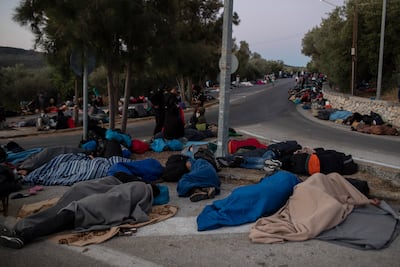Asylum seekers continue to suffer poor treatment in Greece a year after a fire destroyed the Moria camp, humanitarian groups have said.
Activists accused the Greek government of pursuing "harmful policies focused on deterring and containing asylum seekers and refugees".
A group of 45 NGOs and civil society groups urged the European Union and Greek government to abandon plans to restrict the movement of people in camps that Amnesty International compared to prisons.
The European Commission is providing financial and technical support to Greece to build walls around dozens of existing camps and construct new sites in remote locations on the Aegean islands to house migrants, a report said.
European Home Affairs Commissioner Ylva Johansson last March announced €276 million ($330m) of EU funding to build migrant centres on five Aegean islands facing Turkey, including Lesbos.
Daphne Panayotatos, an advocate for Refugees International Europe, said it was "disheartening to see how little has changed" over the past year.
"Asylum seekers in Greece still languish in camps on the islands and the mainland" including at a site nicknamed Moria 2.0, she said.
"Europe has an opportunity to show what a humane, rights-based response to displacement should look like. They must abandon long-standing policies of externalisation and containment and instead fulfil their legal and moral obligations to grant protection to those who need it."
As numbers grew to 20,000 at Moria, Europe's biggest camp, it became a byword for squalor and violence.
The camp burnt down on September 9 last year. No one died in the blaze but it sparked a chaotic rush of 12,000 asylum seekers.
A new site was due to open on Lesbos before winter but work has yet to begin. On Samos Island a new camp is due to open at the end of the month.

The report said the new camps would "impede effective identification and protection of vulnerable people, limit access to services and assistance for asylum seekers, and exacerbate the harmful effects of displacement and containment on individuals' mental health".
The International Rescue Committee said 96 per cent of refugees it treats on Lesbos are depressed and 93 per cent suffer from acute anxiety.
Dukas Protogiros, the committee's psychologist on the island, said the Greek government's plans would "simply exacerbate the mental health crisis already experienced by so many people trapped on the islands".
Athens says it has brought order to chaos by tackling overcrowding in the camps. Only 3,752 migrants remain on Lesbos today, compared with 13,000 a year ago, official statistics show.
"We managed to regain control," Migration Minister Notis Mitarachi said.
"We reduced flows, we reduced residents, we minimised the impact on local communities. We have turned an uncontrollable crisis into a manageable situation."
Human rights groups attribute the reduction in numbers to a policy of forcibly pushing arrivals back to Turkey. The conservative Greek government denies such claims.


